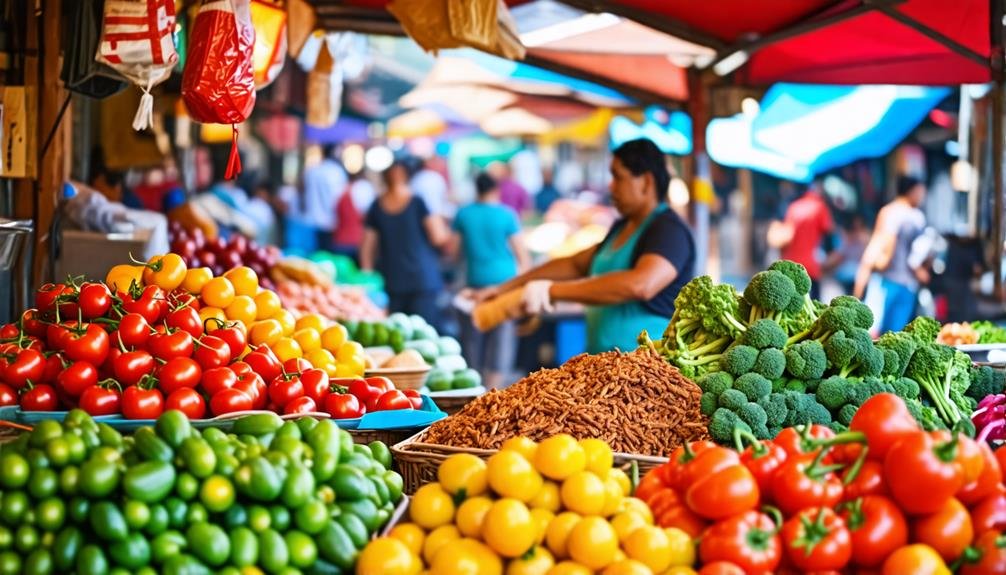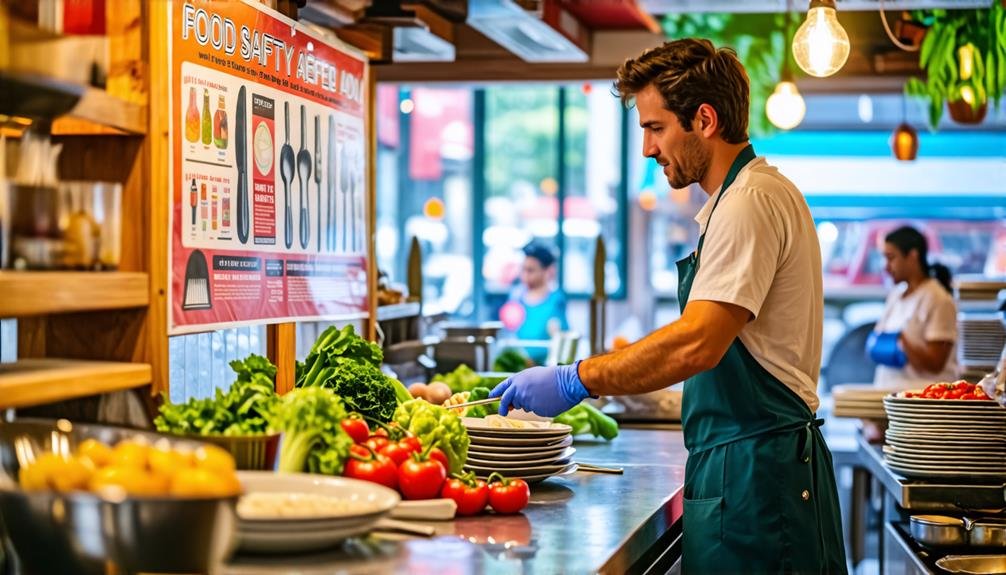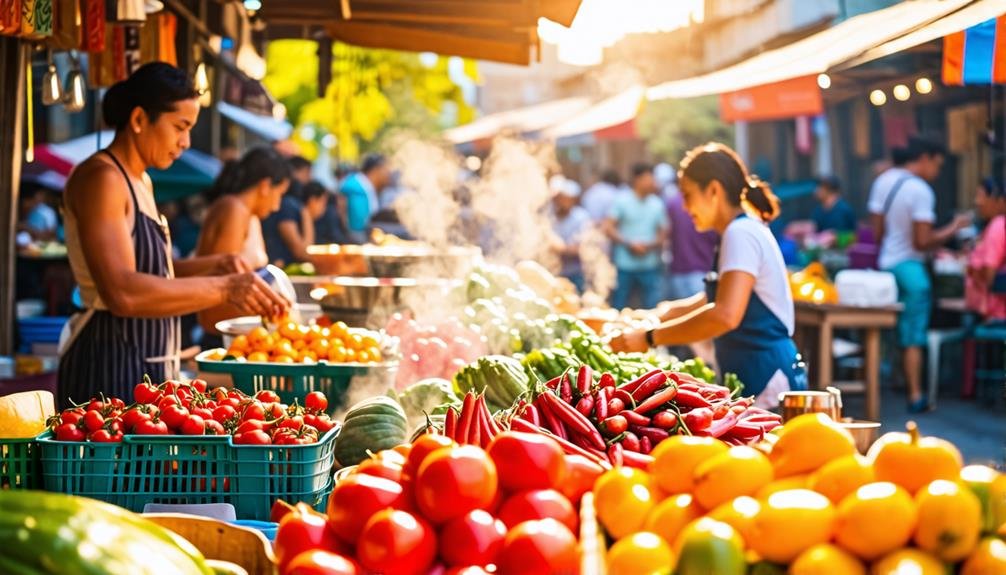Rick Steves provides valuable guidance for avoiding food poisoning while dining abroad. He emphasizes evaluating restaurant cleanliness by checking the exterior, the condition of floors, utensils, and restrooms, as these reflect hygiene practices. Choosing busy restaurants can also ensure fresher ingredients. Opting for hot meals is crucial, as heat effectively neutralizes harmful microorganisms. Steves advises against buffet-style dining to minimize exposure to bacteria and suggests selecting thicker-skinned fruits and vegetables. Moreover, he recommends requesting thoroughly cooked meats and avoiding pre-prepared dishes. These strategies can greatly reduce the risk of foodborne illness during your travels, leading to a safer culinary experience.
Assessing Restaurant Cleanliness
Evaluating restaurant cleanliness is essential for ensuring a safe dining experience. Cleanliness serves as a reliable indicator of the establishment's overall hygiene standards. The exterior appearance, including outdoor seating areas and glass panes, sets expectations for diners. A tidy sidewalk free of litter reflects a restaurant that values cleanliness and safety for patrons.
Inside, the condition of floors, cutlery, menus, and condiment stations is critical for hygiene assessment. A disordered environment might lead to foodborne illnesses, jeopardizing health. Additionally, the cleanliness of restrooms can provide insight into overall hygiene practices. Neglected bathrooms often signal a broader lack of attention to cleanliness throughout the restaurant.
Travel expert Rick Steves advises diners to heed these observations, as they can significantly influence the dining experience. By assessing cleanliness, diners can make informed decisions, enhancing their culinary adventures while reducing health risks. Ensuring that dishes are served hot and the environment is sanitary can be crucial for enjoying a pleasant and safe meal while traveling.
Essential Dining Tips
When dining in foreign countries, it's important to use specific strategies to reduce the risk of foodborne illness while enjoying local dishes. By being careful with your dining selections and habits, you can enjoy the culinary experience without endangering your health. Here are some essential tips:
- Select Busy Restaurants: Choose eateries like local diners or popular bistros that attract many customers, as a high volume of patrons usually means fresher ingredients.
- Opt for Hot Meals: Always go for entrees that are served piping hot, since high temperatures can kill harmful microorganisms.
- Avoid All-You-Can-Eat Buffets: Stay away from buffet-style dining, where food might remain out for long durations, creating conditions for bacteria to multiply.
- Choose Fresh Fruits and Vegetables: When picking produce, select thicker-skinned options like bananas or oranges that can be peeled to lower the risk of contamination.
Understanding Food Poisoning Risks

Travelers must be aware of food poisoning risks, as the chance of encountering foodborne illnesses can differ significantly depending on the location and dining options. Studies reveal that between 30% and 70% of international travelers experience gastrointestinal distress, underscoring the need for awareness. Areas with lower sanitary standards often report higher occurrences of foodborne diseases, especially in developing nations.
Visitors to affluent regions typically face minimal risks; however, caution is essential. Buffets, for example, pose particular dangers due to fluctuating food temperatures that can promote bacterial growth. Ensuring that meals are served steaming hot is crucial, as heat effectively neutralizes harmful microorganisms.
Moreover, the hygiene of the dining venue plays a vital role. The appearance of a restaurant's exterior, along with the cleanliness of its kitchen and eating spaces, can offer valuable insights into hygiene practices. By recognizing these risks, travelers can make educated decisions, enabling them to enjoy diverse culinary experiences while reducing the risk of food poisoning. Acknowledging potential dangers allows travelers to safeguard their health and embrace the joy of discovering new flavors.
Rick Steves' Key Recommendations
Renowned travel expert Rick Steves highlights essential strategies for safe dining while exploring new locales. His recommendations aim to help travelers avoid foodborne illness.
- Avoid unkempt eateries: Steves suggests steering clear of restaurants that appear dirty, as this may indicate poor hygiene practices.
- Request thoroughly cooked meat: When ordering, say 'well done' in the local language to ensure the meat is cooked properly, minimizing the risk of illness.
- Skip pre-prepared dishes: Food items that have been left out can be contaminated. Choosing freshly prepared meals is a safer option.
- Exercise caution at buffets: Steves warns against consuming food that has been exposed for long periods, especially at buffets where temperature control may compromise safety.
Evaluating Hygiene Standards

Evaluating hygiene standards in restaurants is essential for ensuring a safe dining experience while traveling. Begin by inspecting the restaurant's exterior; a clean facade and well-kept outdoor seating areas indicate a commitment to cleanliness. Check for litter-free sidewalks, as this reflects the establishment's overall sanitation practices.
Once inside, examine the floors, utensils, menus, and condiment containers. A careful review of these aspects can highlight the restaurant's focus on hygiene.
Visiting the restroom is another important step, as its cleanliness often reflects the kitchen's standards. Observe whether chefs utilize utensils properly and wear clean gloves, and ensure that cashiers do not handle food, as this can result in contamination. Steer clear of establishments with poor hygiene; the chances of foodborne illnesses increase in such settings.
Additionally, be cautious with popular dining spots highlighted in travel guides, as they may not prioritize sanitation. Instead, search for local eateries, especially during peak dining hours when food is likely freshly prepared. By thoroughly assessing hygiene standards, you can savor delicious meals without compromising your health while enjoying the adventure of discovering new culinary delights.





































